- Home
- Harlan Coben
One False Move: A Myron Bolitar Novel Page 7
One False Move: A Myron Bolitar Novel Read online
Page 7
In this case TruPro would quickly realize that it needed to get Brenda away from its competition. So it started applying pressure. It put the screws to her manager—her father—and then moved on to Brenda herself. It was a classic scare tactic. But that scenario was not without problems. The phone call that mentioned Brenda’s mother, for example—how did that fit in?
The coach blew the whistle ending practice. She gathered her players around, reminded them that they needed to be back in two hours for the second session, thanked them for their hustle, dismissed them with a clap.
Myron waited for Brenda to shower and get dressed. It didn’t take her long. She came out in a long red T-shirt and black jeans, her hair still wet.
“Did Mabel know anything?” she asked.
“Yes.”
“Has she heard from Dad?”
Myron nodded. “She says he’s on the run. Two men came to her house looking for him. They roughed her up a bit.”
“My God, is she okay?”
“Yes.”
She shook her head. “What’s he on the run from?”
“Mabel doesn’t know.”
Brenda looked at him, waited a beat. “What else?” she said.
Myron cleared his throat. “Nothing that can’t wait.”
She kept looking at him. Myron turned and headed for his car. Brenda followed.
“So where we going?” she asked.
“I thought we’d stop by St. Barnabas and talk to your father’s supervisor.”
She caught up to him. “You think he knows something?”
“Highly doubtful. But this is what I do. I go poking around and hope something stirs.”
They reached the car. Myron unlocked the doors, and they both got in.
“I should be paying you for your time,” she said.
“I’m not a private investigator, Brenda. I don’t work by the hour.”
“Still. I should be paying you.”
“Part of client recruitment,” Myron said.
“You want to represent me?”
“Yes.”
“You haven’t made much of a sales pitch or applied any pressure.”
“If I had,” he said, “would it have worked?”
“No.”
Myron nodded and started up the car.
“Okay,” she said. “We’ve got a few minutes. Tell me why I should choose you and not one of the big boys. Personal service?”
“Depends on your definition of personal services. If you mean someone always following you around with lips firmly planted on your buttocks, then no, the big boys are better at puckering. They have the staff for it.”
“So what does Myron Bolitar offer? A little tongue with those lips?”
He smiled. “A total package designed to maximize your assets while allowing room for integrity and a personal life.”
She nodded. “What a crock.”
“Yeah, but it sounds good. In truth, MB SportsReps is a three-prong system. Prong one is earning money. I’m in charge of negotiating all contracts. I will continually seek out new endorsement deals for you and whenever possible get a bidding war going for your services. You’ll make decent money playing for the WPBA, but you’ll make a hell of a lot more on endorsements. You got a lot of pluses in that department.”
“Such as?”
“Three things off the top of my head. One, you’re the best female player in the country. Two, you’re studying to be a doctor—a pediatrician, no less—so we can play up the whole role model thing. And three, you’re not hard on the eyes.”
“You forgot one.”
“What?”
“Four, that perennial white man favorite: well spoken. You ever notice that no one ever describes a white athlete as well spoken?”
“As a matter of fact, I have. It’s why I left it off the list. But the truth is, it helps. I’m not going to get into a debate on Ebonics and the like, but if you are what is commonly referred to as well spoken, it adds revenue. Simple as that.”
She nodded. “Go on.”
“In your case we need to design a strategy. Clearly you would have tremendous appeal to clothing and sneaker companies. But food products would love you too. Restaurant chains.”
“Why?” she asked. “Because I’m big?”
“Because you’re not waiflike,” Myron corrected. “You’re real. Sponsors like real—especially when it comes in an exotic package. They want someone attractive yet accessible—a contradiction, but there you go. And you have it. Cosmetic companies will want to get in on this too. We could also pick up a lot of local deals, but I would advise against it in the beginning. Try to stick with the national markets where we can. It doesn’t pay to go after every dime out there. But that will be up to you. I’ll present them to you. The final decision is always yours.”
“Okay,” she said. “Give me prong two.”
“Prong two is what you do with your money after you earn it. You’ve heard of Lock-Horne Securities?”
“Sure.”
“All of my clients are required to set up a long-term financial plan with their top man, Windsor Home Lockwood the Third.”
“Nice name.”
“Wait till you meet him. But ask around. Win is considered one of the best financial advisers in the country. I insist that every client meet with him quarterly—not by fax or phone but in person—to go over their portfolios. Too many athletes get taken advantage of. That won’t happen here, not because Win or I am watching your money but because you are.”
“Impressive. Prong three?”
“Esperanza Diaz. She is my right hand and handles everything else. I mentioned before that I’m not the best with ass kissing. That’s true. But the reality of this business means I have to wear a lot of hats—travel agent, marriage counselor, limo driver, whatever.”
“And this Esperanza helps out with all that?”
“She’s crucial.”
Brenda nodded. “Sounds like you give her the shit detail.”
“Esperanza just graduated law school, as a matter of fact.” He tried not to sound too defensive, but her words had struck bone. “She takes on more responsibility every day.”
“Okay, one question.”
“What?” Myron asked.
“What aren’t you telling me about your visit to Mabel?”
Myron said nothing for a moment.
“It’s about my mother, isn’t it?”
“Not really. It’s just …” He let his voice drift off before starting up again. “Are you sure you want me to find her, Brenda?”
She crossed her arms and slowly shook her head. “Cut it out.”
“What?”
“I know you think protecting me is sweet and noble. But it’s not. It’s annoying and insulting. So stop it. Now. If your mother ran away when you were five, wouldn’t you want to know what happened?”
Myron thought about it, nodded. “Point taken. I won’t do it again.”
“Fine. So what did Mabel say?”
He recounted his conversation with her aunt. Brenda stayed still. She reacted only when he mentioned the phone calls Mabel and perhaps her father had received from her mother.
“They never told me,” she said. “I suspected as much, but”—she looked at Myron—“looks like you weren’t the only one who thought I couldn’t handle the truth.”
They fell into silence and continued the drive. Before making the left off Northfield Avenue, Myron noticed a gray Honda Accord in the rearview mirror. At least it looked like a Honda Accord. All cars pretty much looked the same to Myron, and there was no vehicle more unassuming than a gray Honda Accord. No way to tell for sure, but Myron thought that maybe they were being followed. He slowed down, memorized the license plate. New Jersey plate. 890UB3. When he entered the St. Barnabas Medical Center lot, the car drove on. Didn’t mean anything. If the guy doing the tailing was good, he’d never pull in behind him.
St. Barnabas was bigger than when he was a kid, but what hospital wasn
’t? His dad had taken Myron here several times when he was a kid, for sprains and stitches and X rays and even one ten-day stint for rheumatic fever when he was twelve.
“Let me talk to this guy alone,” Myron said.
“Why?”
“You’re the daughter. He may speak more freely without you there.”
“Yeah, okay. I have some patients I’m following on the fourth floor anyway. I’ll meet you back down in the lobby.”
Calvin Campbell was in full uniform when Myron found him in the security office. He sat behind a high counter with several dozen TV monitors running. The pictures were in black and white and, from what Myron could see, completely uneventful. Campbell’s feet were up. He was downing a submarine sandwich slightly longer than a baseball bat. He took off his policelike cap to reveal tightly curled white hair.
Myron asked him about Horace Slaughter.
“He didn’t show for three straight days,” Calvin said. “No call, no nothing. So I fired his ass.”
“How?” Myron asked.
“What?”
“How did you fire him? In person? On the phone?”
“Well, I tried to call him. But nobody answered. So I wrote a letter.”
“Return receipt?”
“Yes.”
“Did he sign it?”
He shrugged. “Haven’t gotten it back yet, if that’s what you mean.”
“Was Horace a good worker?”
Calvin’s eyes narrowed. “You a private eye?”
“Something like that.”
“And you’re working for the daughter?”
“Yes.”
“She got juice.”
“Huh?”
“Juice,” Calvin repeated. “I mean, I never wanted to hire the man in the first place.”
“So why did you?”
He scowled. “Don’t you listen? His daughter got juice. She’s tight with some of the bigwigs here. Everybody likes her. So you start hearing things. Rumors, you know. So I figured, what the hell. Being a security guard ain’t brain surgery. I hired him.”
“What kind of rumors?”
“Hey, don’t get me in the middle here.” He held his palms as though pushing trouble back. “People talk, is all I’m saying. I’ve been here eighteen years. I ain’t one to make waves. But when a guy don’t show for work, well, I have to draw the line.”
“Anything else you can tell me?”
“Nope. He came. He did his job okay, I guess. Then he didn’t show and I fired him. End of story.”
Myron nodded. “Thank you for your time.”
“Hey, man, can you do me a favor?”
“What?” Myron asked.
“See if his daughter can clear out his locker. I got a new man coming on board, and I could use the space.”
Myron took the elevator up to the pediatric floor. He circled the nurses’ station and spotted Brenda through a big window. She was sitting on the bed of a little girl who could not have been more than seven. Myron stopped and watched for a moment. Brenda had put on a white coat, a stethoscope draped around her neck. The little girl said something. Brenda smiled and put the stethoscope on the little girl’s ears. They both laughed. Brenda beckoned behind her, and the girl’s parents joined them on the bed. The parents had gaunt faces—the sunken cheeks, hollow eyes of the terminally harrowed. Brenda said something to them. More laughter. Myron continued to watch, mesmerized.
When she finally came out, Brenda walked straight to him. “How long have you been standing here?”
“Just a minute or two,” he said. Then he added, “You like it here.”
She nodded. “It’s even better than being on the court.”
Enough said.
“So what’s up?” she asked.
“Your father has a locker here.”
They took the elevator to the basement. Calvin Campbell was waiting for them. “Do you know the combination?” he asked.
Brenda said no.
“No problem.” Calvin had a lead pipe in his hand. With practiced precision he belted the combination lock. It shattered like glass. “You can use that empty carton in the corner,” he said. Then he sauntered out.
Brenda looked at Myron. He nodded. She reached out and opened the locker. An odor like oft-soiled socks popped out. Myron made a face and looked in. Using his index finger and thumb like a pair of tweezers, he lifted a shirt into view. The shirt looked like the before picture in a Tide commercial.
“Dad wasn’t great with laundry,” Brenda said.
Or with throwing away garbage, from the looks of things. The entire locker resembled a condensed frat house. There were dirty clothes and empty cans of beer and old newspapers and even a pizza box. Brenda brought over the carton, and they began to load stuff in. Myron started with a pair of uniform pants. He wondered if Horace owned them or if they belonged to the hospital, and then he wondered why he was wondering about something so irrelevant. He searched through the pockets and pulled out a crumpled ball of paper.
Myron smoothed it out. An envelope. He plucked out a sheet of paper and began to read.
“What is it?” Brenda asked.
“A letter from an attorney,” Myron said.
He handed it to her:
Dear Mr. Slaughter:
We are in receipt of your letters and are aware of your constant communications with this office. As explained to you in person, the matter you are asking about is confidential. We ask you to kindly stop contacting us. Your behavior is fast approaching harassment.
Sincerely,
Thomas Kincaid
“Do you know what he’s talking about?” Myron asked.
She hesitated. “No,” she said slowly. “But that name—Thomas Kincaid—it rings a bell. I just can’t place it.”
“Maybe he did work for your dad before.”
Brenda shook her head. “I don’t think so. I can’t remember my father ever hiring a lawyer. And if he had, I doubt he would have gone to Morristown.”
Myron took out his cellular phone and dialed the office. Big Cyndi answered and transferred the call to Esperanza.
“What?” Esperanza said. Always with the pleasantries.
“Did Lisa fax over Horace Slaughter’s phone bill?”
“It’s right in front of me,” Esperanza said. “I was just working on it.”
Scary as it might sound, getting a list of someone’s long-distance calls had always been fairly easy. Almost every private investigator has a source at the phone company. All it takes is a little grease.
Myron signaled that he wanted the letter back. Brenda handed it to him. Then she knelt and extracted a plastic bag from the back of the locker. Myron looked at the phone number for Kincaid’s office on the letter.
“Is five-five-five-one-nine-zero-eight on there?” he asked.
“Yeah. Eight times. All less than five minutes.”
“Anything else?”
“I’m still tracking down all the numbers.”
“Anything stick out?”
“Maybe,” Esperanza said. “For some reason he called Arthur Bradford’s gubernatorial headquarters a couple of times.”
Myron felt a familiar, not unpleasant jolt. The Bradford name rears its ugly head yet again. Arthur Bradford, one of two prodigal sons, was running for governor in November. “Okay, good. Anything else?”
“Not yet. And I found nothing—I mean, nada—on Anita Slaughter.”
No surprise there. “Okay, thanks.”
He hung up.
“What?” Brenda asked.
“Your father has been calling this Kincaid guy a lot. He’s also called Arthur Bradford’s campaign headquarters.”
She looked confused. “So what does that mean?”
“I don’t know. Was your dad political at all?”
“No.”
“Did he know Arthur Bradford or anybody connected with the campaign?”
“Not that I’m aware of.” Brenda opened the garbage bag and peered inside. Her fa
ce went slack. “Oh Christ.”
Myron dropped down next to her. Brenda spread open the top of the bag so he could see the contents. A referee’s shirt, black and white striped. On the right breast pocket was a patch reading “New Jersey Basketball Referee Association.” On the left breast was a big crimson stain.
A bloodstain.
“We should call the police,” Myron said.
“And tell them what?”
Myron was not sure. The bloody shirt didn’t have a hole in it—there were no rips or tears visible—and the stain was a concentrated fan shape over the left breast. How had it gotten there? Good question. Not wanting to contaminate any possible clues, Myron gave the shirt a quick, gentle once-over. The stain was thick and looked a bit sticky, if not wet. Since the shirt had been wrapped in a plastic bag, it was hard to say how long the blood had been there. Probably not long, though.
Okay, good. Now what?
The position of the stain itself was puzzling. If Horace had been wearing the shirt, how could the blood have ended up on just that one spot? If, for example, he had a bloody nose, the stain would be more widespread. If he had been shot, well, there’d be a hole in the shirt. If he had hit somebody else, again the stain would probably be more like a spray or at least more dispersed than this.
Why was the stain so concentrated in that one spot?
Myron studied the shirt again. Only one scenario fit: Horace had not been wearing the shirt when the injury occurred. Strange but probably true. The shirt had been used to stave off blood flow, like a bandage. That would explain both the placement and concentration. The fan shape indicated it had probably been pressed against a bleeding nose.
Okey-dokey, we’re on a roll. It didn’t help him in any way, shape, or form. But rolling was good. Myron liked to roll.
Brenda interrupted his thoughts. “What are we going to tell the police?” she asked again.
“I don’t know.”
“You think he’s on the run, right?”
“Yes.”

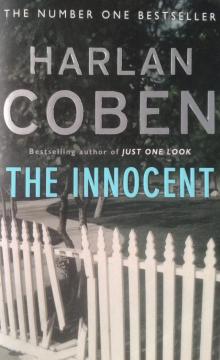 The Innocent
The Innocent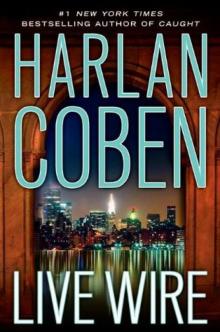 Live Wire
Live Wire Play Dead
Play Dead Drop Shot
Drop Shot Seconds Away
Seconds Away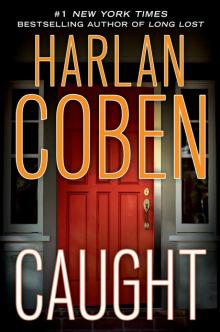 Caught
Caught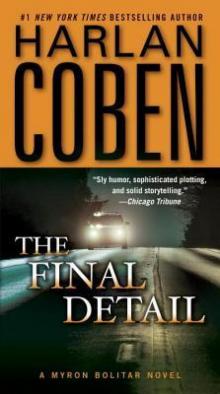 The Final Detail
The Final Detail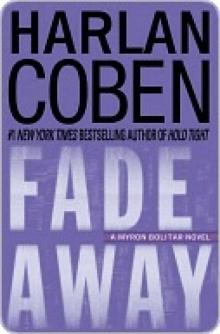 Fade Away
Fade Away Home
Home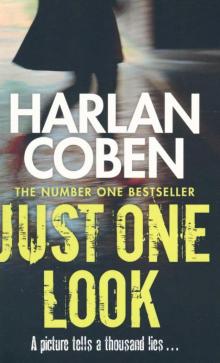 Just One Look
Just One Look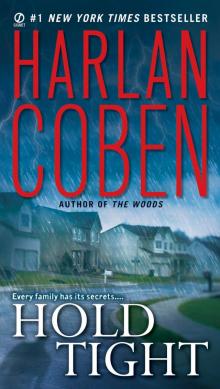 Hold Tight
Hold Tight Fool Me Once
Fool Me Once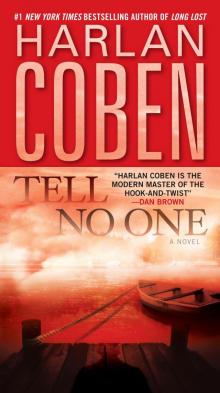 Tell No One
Tell No One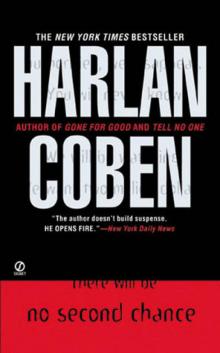 No Second Chance
No Second Chance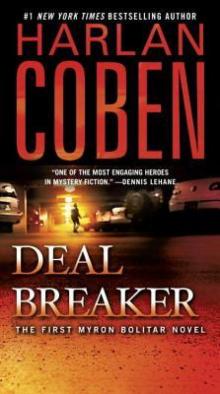 Deal Breaker
Deal Breaker Long Lost
Long Lost One False Move
One False Move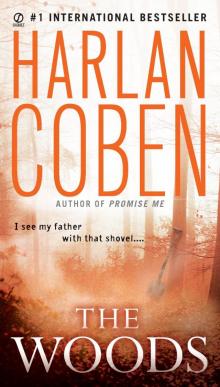 The Woods
The Woods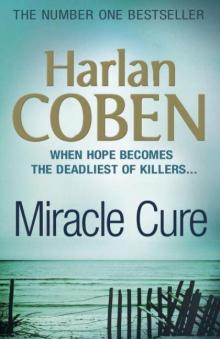 Miracle Cure
Miracle Cure Found
Found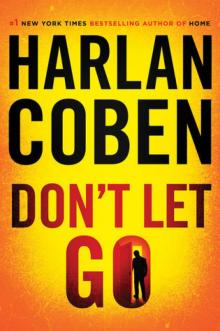 Don't Let Go
Don't Let Go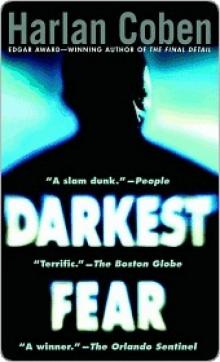 Darkest Fear
Darkest Fear The Stranger
The Stranger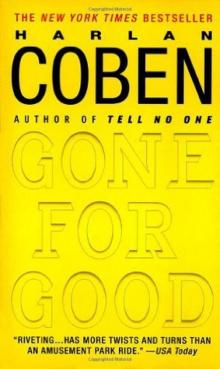 Gone for Good
Gone for Good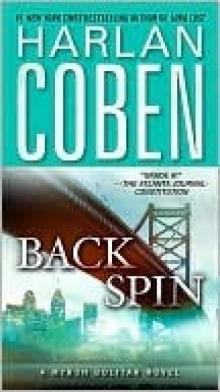 Back Spin
Back Spin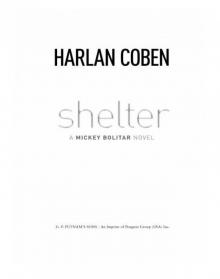 Shelter
Shelter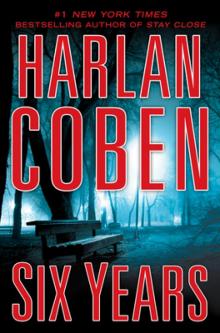 Six Years
Six Years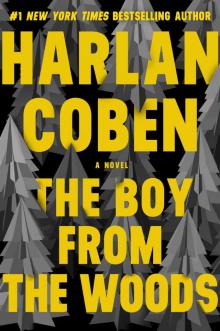 The Boy from the Woods
The Boy from the Woods Missing You
Missing You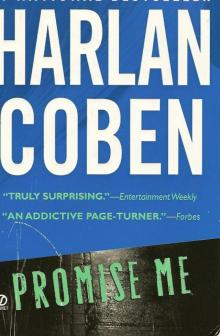 Promise Me mb-8
Promise Me mb-8 The Final Detail: A Myron Bolitar Novel
The Final Detail: A Myron Bolitar Novel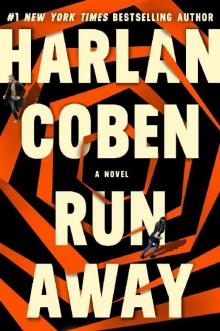 Run Away
Run Away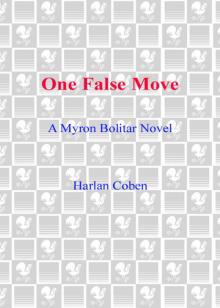 One False Move: A Myron Bolitar Novel
One False Move: A Myron Bolitar Novel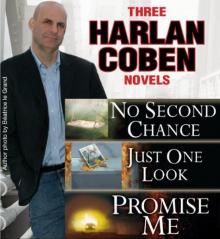 Three Harlan Coben Novels
Three Harlan Coben Novels the Woods (2007)
the Woods (2007) Tell No One (2001)
Tell No One (2001) the Innocent (2005)
the Innocent (2005)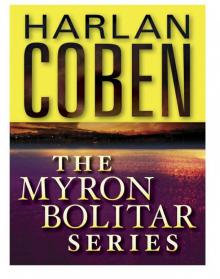 The Myron Bolitar Series 7-Book Bundle
The Myron Bolitar Series 7-Book Bundle Gone for Good (2002)
Gone for Good (2002) Caught (2010)
Caught (2010) Hold Tight (2008)
Hold Tight (2008)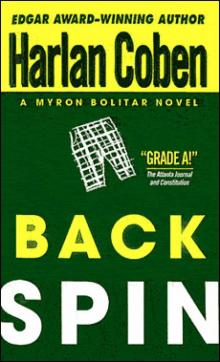 04 - Back Spin
04 - Back Spin Miracle Cure (1991)
Miracle Cure (1991) Harlan Coben 3 Novel Collection
Harlan Coben 3 Novel Collection Just One Look (2004)
Just One Look (2004)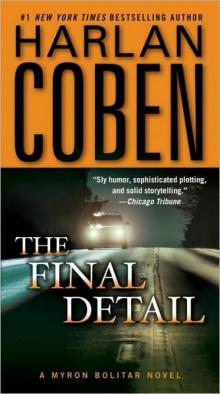 The Final Detail mb-6
The Final Detail mb-6 Play Dead (2010)
Play Dead (2010)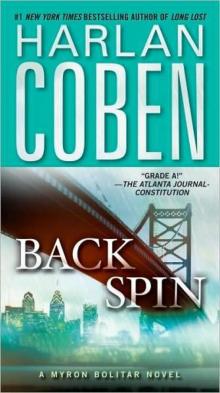 Back Spin mb-4
Back Spin mb-4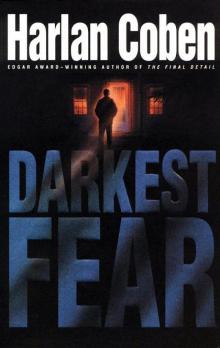 Darkest Fear mb-7
Darkest Fear mb-7